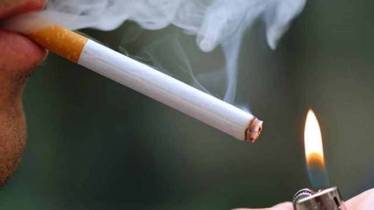By Dr. K Madan Gopal
On the occasion of World No Tobacco Day, we must turn our attention to the pervasive issue of smokeless tobacco (SLT) in India. Alarming figures show that SLT usage is not only common but also contributes significantly to sickness and mortality. With almost 199 million SLT users worldwide, roughly 65 percent of them are in India, immediate action is required to address this public health catastrophe.
Smokeless tobacco, commonly known as spit tobacco, chewing tobacco, chew, and dip, involves the placement of tobacco leaves in the mouth instead of smoking them in cigarettes. Many people are unaware that even the most basic SLT goods contain a complex mixture of approximately 4,000 distinct chemicals, many of which are harmful, mutagenic, and carcinogenic. This prompts grave worries regarding the potential health hazards of using SLT.
With over 26 crore tobacco smokers across all ages and genders, India disproportionately suffers the burden of SLT usage. Shockingly, more than 10 lakh people lose their lives every year in India due to tobacco-related diseases. The two most commonly used SLT products among adults in India are khaini and gutkha, with the latter also containing areca nut as an ingredient. This combination poses an even greater risk, as areca nut is classified as a class-1 carcinogen. Further, there is increasing evidence of tobacco affecting sperm count, sperm motility and causing miscarriages.
The effects of SLT use are severe; as a result, 0.65 million people every year lose their lives a result of its use. These figures portray a sobering picture of the harm being done to people and communities. Additionally, SLT is used outside of India as well. Recent surveillance data show that SLT use is spreading globally, with over 356 million users in 140 countries, with Southeast Asia bearing the brunt of this addiction.
Both international and national efforts have been made to reduce SLT use in response to this growing hazard. The World Health Organization‘s (WHO) Framework Convention on Tobacco Control (FCTC), the first international public health treaty, lays out supply and demand reduction strategies to combat tobacco use in all its forms. India, a pioneer in SLT prevention and control, has put important laws into effect and has seen success in the judiciary’s efforts to safeguard the public’s health.
However, fighting SLT still presents several difficulties. Effective control strategies are significantly hampered by the high prevalence and variety of SLT. The manufacture of SLT products in conventional markets is uncontrolled, and the SLT business interferes with the implementation of legislation. The problem is made worse by sociocultural obstacles and structural issues such as a lack of resources and enforcement power.
It’s essential to take a multifaceted approach to overcome these obstacles. Priority should be given to educating the public about the health dangers connected to SLT use. To dispel myths and encourage informed decision-making, educational initiatives should be established that target communities and schools. To limit the availability and promotion of SLT products, stricter laws, and regulations should be put in place, including requirements for uniform labeling and plain packaging.
In addition, it’s critical to offer cessation programs that are both reasonable and accessible to those SLT users who want to quit. To support people on their path to a tobacco-free life, cessation programs, counseling services, and nicotine replacement medicines should be easily accessible. To comprehend the patterns and trends of SLT consumption, its health implications, and the efficacy of therapies, research, and surveillance efforts should be stepped up at the same time.
As we observe, World No Tobacco Day, let’s be mindful of how urgent it is to confront the smokeless tobacco crisis in India. We can significantly advance in addressing this serious public health issue by putting into place all-encompassing measures and placing a high priority on each person’s health and well-being.
First and foremost, it’s crucial to step up public awareness initiatives to inform people about the risks associated with using smokeless tobacco (SLT). These efforts ought to concentrate on debunking myths and emphasizing the serious health hazards connected to SLT intake. We can lay a solid foundation of information and comprehension regarding the negative impacts of SLT through educational initiatives in schools and communities, particularly those geared toward young people.
To further regulate the availability and marketing of SLT products, stricter regulation, and enforcement are required. The sale of SLTs next to educational facilities should be further restricted, and existing laws should be strictly implemented. To lessen the appeal of SLT and discourage its use, plain packaging and standardized labeling regulations will be implemented.
Additionally, the development of easily accessible and reasonably priced cessation services is essential to aiding those who want to stop using SLT. Programs for quitting, counseling, and the availability of nicotine replacement medicines should all be part of these services. We can enable SLT users to overcome their addiction and lead healthier lives by offering the appropriate support.
To comprehend SLT usage trends, its effects on health, and the efficacy of therapies, research, and surveillance initiatives should be prioritized. This information will assist in making evidence-based policy decisions and in assessing the success of tobacco control initiatives. We can continuously hone and improve our efforts to successfully combat the SLT epidemic by funding research projects.
Let’s work together to address the smokeless tobacco crisis in India on this World No Tobacco Day. We can safeguard people’s health and well-being, lessen the burden of tobacco-related diseases, and pave the road for a smoke-free future through awareness, legislation, cessation support, and research. Together, we can significantly impact the situation and guarantee a happier, healthier future for all.
( The author is currently working as Advisor – Public Health Administration at NHSRC-MoHFW GOI and was Former Senior Consultant at NITI Aayog, GOI)
Disclaimer: Views expressed are personal and do not reflect the official position or policy of Financial Express Online. Reproducing this content without permission is prohibited.
